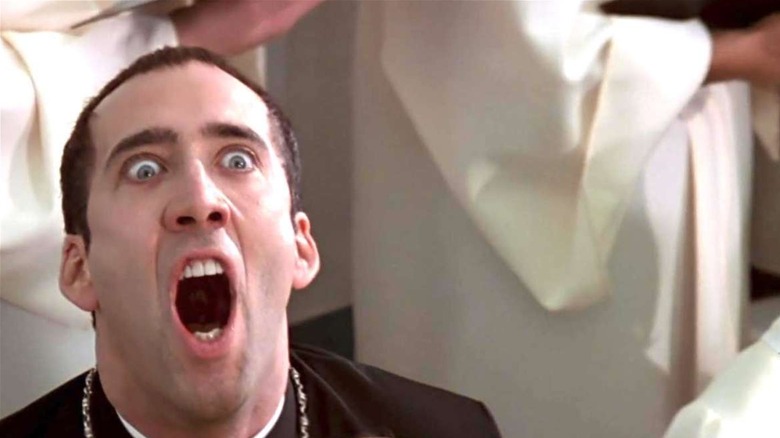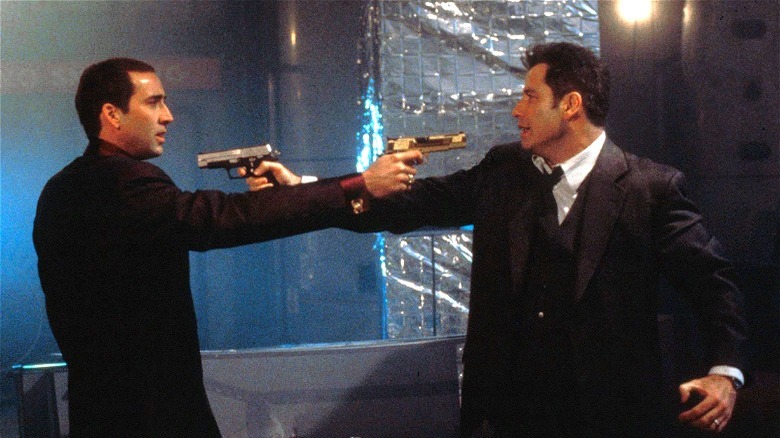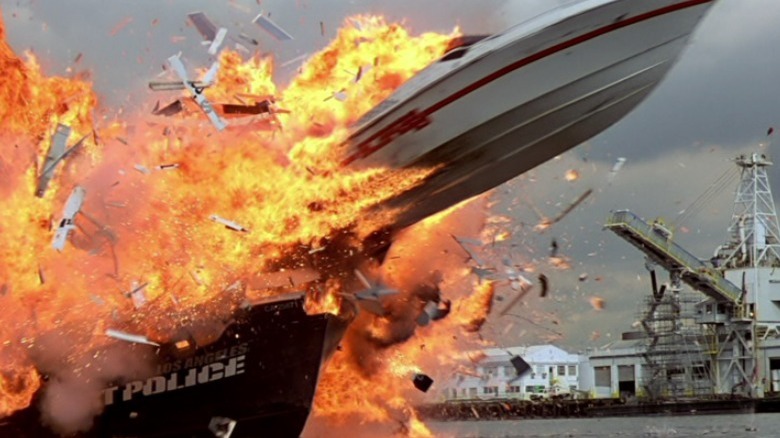Believe It Or Not, Face/Off Could Have Been Even Weirder
"Face/Off" is undoubtedly a bonkers movie, right down to the premise itself. In the early stages of the film's development, however, the plot was even crazier, which means that, amazingly, the final theatrical version is toned down from its original plans. That doesn't make Nicolas Cage's psychopathic performance as Castor Roy, or the face transplant surgical procedure, or the highly improbably but absolutely awesome action sequences any less admirably insane, of course. It just means that screenwriters have to aim high if they have any hope of seeing at least a portion of their most outlandish ideas make it to the screen.
Director John Woo is most often credited with infusing "Face/Off" with its high-octane visual energy, but the action movie cult classic was born out of the brain of screenwriters Mike Werb and Michael Colleary, the former of which also wrote "The Mask." Warner Bros. sat on the script for years before the rights expired and it moved to Paramount. And luckily for the duo, they retained their creative control over this time. According to Werb himself, the project rotated through three directors before Woo and the duo wrote over thirty drafts, so it's no surprise that there was some material left out of the final product.
Facing off in the future
In the very early stages of development, Werb and Colleary were already leaning towards the weird and whacky, though they were very much inspired by real-world incidents. In an interview with Writers Super Center, Werb explains that an acquaintance of his had to have his face removed, reconstructed, and reapplied after a hang-gliding accident, leading to the idea for the core premise of "Face/Off." The screenwriter mentions voodoo as one of the face-switching methods he tossed around, but he claims that he wanted "to make it as real and sick and psychological as possible."
The most significant change from the script's initial stages was the time period the film is set in. Since face-swapping technology was unheard of, the most logical point of course was to set "Face/Off" far in the future, complete with flying cars and chimpanzee laborers. According to a profile on the film by ShortList that includes this information from Colleary, it was John Woo who wanted to switch the setting to the (at the time) much closer year of 2002 in order to focus on the more intimate, character-driven moments.
There were also more specific moments that were cut from the film. For instance, Werb said that there were various methods of trying to violently knock out Castor Troy in the first action sequence, including liquid nitrogen, electrocution, and a crash through an air traffic control tower. Finally, the filmmaking team settled on Troy getting almost sucked into a plane turbine and smashed against a metal grate. In addition, Sean Archer almost slept with Troy's girlfriend in retaliation for the slimy Troy taking advantage of his new identity by getting intimate with Archer's wife. The thing is, as creepy as Troy is, his actions make sense considering his villainy. The writers thankfully remembered that Archer pulling the same stunt wouldn't be a very heroic act.
Hallelujah for revisions
As weird as "Face/Off" is, the film still gels because of its super tight action set pieces and the performances of its lead actors playing opposite versions of each other. It actually might be for the best that the original plans were toned down since, according to Werb, focusing more on the characters was what helped the film gain traction in its development phase:
"The favorite review we got was from the Washington Post, which said, 'Hats off to Paramount for green lighting the strangest studio film ever made.' It is a strange movie, and I think that the more we changed it into a psychological piece, the more we were able to attract people like John Woo and those two brilliant actors. Without John Woo, Nic Cage, and John Travolta, it could easily have been bad."
In other words, setting "Face/Off" in a futuristic prison may have meant no John Woo style or Nicolas Cage antics, parts of what makes the film so memorable and uniquely weird in its own charming right.


